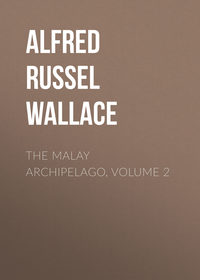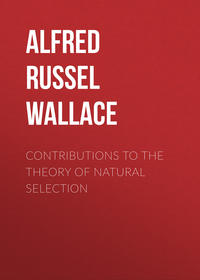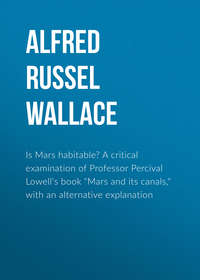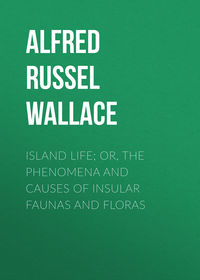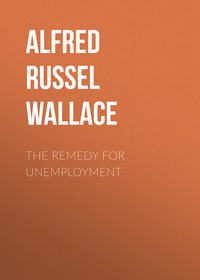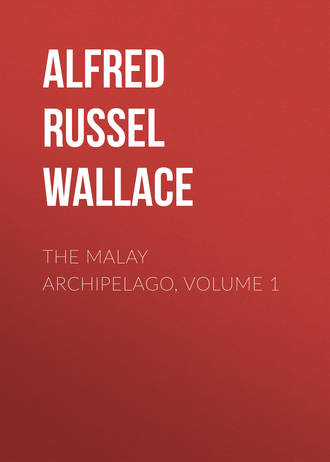 полная версия
полная версияThe Malay Archipelago, Volume 1
I first visited Timor in 1857, staying a day at Coupang, the chief Dutch town at the west end of the island; and again in May 1859, when I stayed a fortnight in the same neighbourhood. In the spring of 1861 I spent four months at Delli, the capital of the Portuguese possessions in the eastern part of the island.
The whole neighbourhood of Coupang appears to have been elevated at a recent epoch, consisting of a rugged surface of coral rock, which rises in a vertical wall between the beach and the town, whose low, white, red-tiled houses give it an appearance very similar to other Dutch settlements in the East. The vegetation is everywhere scanty and scrubby. Plants of the families Apocynaceae and Euphorbiaceae, abound; but there is nothing that can be called a forest, and the whole country has a parched and desolate appearance, contrasting strongly with the lofty forest trees and perennial verdure of the Moluccas or of Singapore. The most conspicuous feature of the vegetation was the abundance of fine fan-leaved palms (Borassus flabelliformis), from the leaves of which are constructed the strong and durable water-buckets in general use, and which are much superior to those formed from any other species of palm. From the same tree, palm-wine and sugar are made, and the common thatch for houses formed of the leaves lasts six or seven years without removal. Close to the town I noticed the foundation of a ruined house below high-water mark, indicating recent subsidence. Earthquakes are not severe here, and are so infrequent and harmless that the chief houses are built of stone.
The inhabitants of Coupang consist of Malays, Chinese, and Dutch, besides the natives, so that there are many strange and complicated mixtures among the population. There is one resident English merchant, and whalers as well as Australian ships often come here for stores and water. The native Timorese preponderate, and a very little examination serves to show that they have nothing in common with Malays, but are much more closely allied to the true Papuans of the Aru Islands and New Guinea. They are tall, have pronounced features, large somewhat aquiline noses, and frizzly hair, and are generally of a dusky brown colour. The way in which the women talk to each other and to the men, their loud voices and laughter, and general character of self-assertion, would enable an experienced observer to decide, even without seeing them, that they were not Malays.
Mr. Arndt, a German and the Government doctor, invited me to stay at his house while in Coupang, and I gladly accepted his offer, as I only intended making a short visit. We at first began speaking French, but he got on so badly that we soon passed insensibly into Malay; and we afterwards held long discussions on literary, scientific, and philosophical questions in that semi-barbarous language, whose deficiencies we made up by the free use of French or Latin words.
After a few walks in the neighbourhood of the town, I found such a poverty of insects and birds that I determined to go for a few days to the island of Semao at the western extremity of Timor, where I heard that there was forest country with birds not found at Coupang. With some difficulty I obtained a large dugout boat with outriggers, to take me over a distance of about twenty miles. I found the country pretty well wooded, but covered with shrubs and thorny bushes rather than forest trees, and everywhere excessively parched and dried up by the long-continued dry season. I stayed at the village of Oeassa, remarkable for its soap springs. One of these is in the middle of the village, bubbling out from a little cone of mud to which the ground rises all round like a volcano in miniature. The water has a soapy feel and produces a strong lather when any greasy substance is washed in it. It contains alkali and iodine, in such quantities as to destroy all vegetation for some distance around. Close by the village is one of the finest springs I have ever seen, contained in several rocky basins communicating by narrow channels. These have been neatly walled where required and partly levelled, and form fine natural baths. The water is well tasted and clear as crystal, and the basins are surrounded by a grove of lofty many-stemmed banyan-trees, which keep them always cool and shady, and add greatly to the picturesque beauty of the scene.
The village consists of curious little houses very different from any I have seen elsewhere. They are of an oval figure, and the walls are made of sticks about four feet high placed close together. From this rises a high conical roof thatched with grass. The only opening is a door about three feet high. The people are like the Timorese with frizzly or wavy hair and of a coppery brown colour. The better class appear to have a mixture of some superior race which has much improved their features. I saw in Coupang some chiefs from the island of Savu further west, who presented characters very distinct from either the Malay or Papuan races. They most resembled Hindus, having fine well-formed features and straight thin noses with clear brown complexions. As the Brahminical religion once spread over all Java, and even now exists in Bali and Lombock, it is not at all improbable that some natives of India should have reached this island, either by accident or to escape persecution, and formed a permanent settlement there.
I stayed at Oeassa four days, when, not finding any insects and very few new birds, I returned to Coupang to await the next mail steamer. On the way I had a narrow escape of being swamped. The deep coffin-like boat was filled up with my baggage, and with vegetables, cocoa-nut and other fruit for Coupang market, and when we had got some way across into a rather rough sea, we found that a quantity of water was coming in which we had no means of baling out. This caused us to sink deeper in the water, and then we shipped seas over our sides, and the rowers, who had before declared it was nothing, now became alarmed and turned the boat round to get back to the coast of Semao, which was not far off. By clearing away some of the baggage a little of the water could be baled out, but hardly so fast as it came in, and when we neared the coast we found nothing but vertical walls of rock against which the sea was violently beating. We coasted along some distance until we found a little cove, into which we ran the boat, hauled it on shore, and emptying it found a large hole in the bottom, which had been temporarily stopped up with a plug of cocoa-nut which had come out. Had we been a quarter of a mile further off before we discovered the leak, we should certainly have been obliged to throw most of our baggage overboard, and might easily have lost our lives. After we had put all straight and secure we again started, and when we were halfway across got into such a strong current and high cross sea that we were very nearly being swamped a second time, which made me vow never to trust myself again in such small and miserable vessels.
The mail steamer did not arrive for a week, and I occupied myself in getting as many of the birds as I could, and found some which were very interesting. Among them were five species of pigeons of as many distinct genera, and most of them peculiar to the island; two parrots—the fine red-winged broad-tail (Platycercus vulneratus), allied to an Australian species, and a green species of the genus Geoffroyus. The Tropidorhynchus timorensis was as ubiquitous and as noisy as I had found it at Lombock; and the Sphaecothera viridis, a curious green oriole with bare red orbits, was a great acquisition. There were several pretty finches, warblers, and flycatchers, and among them I obtained the elegant blue and red Cyornis hyacinthina; but I cannot recognise among my collections the species mentioned by Dampier, who seems to have been much struck by the number of small songbirds in Timor. He says: "One sort of these pretty little birds my men called the ringing bird, because it had six notes, and always repeated all his notes twice, one after the other, beginning high and shrill and ending low. The bird was about the bigness of a lark, having a small, sharp, black bill and blue wings; the head and breast were of a pale red, and there was a blue streak about its neck." In Semao, monkeys are abundant. They are the common hare-lipped monkey (Macacus cynomolgus), which is found all over the western islands of the Archipelago, and may have been introduced by natives, who often carry it about captive. There are also some deer, but it is not quite certain whether they are of the same species as are found in Java.
I arrived at Delli, the capital of the Portuguese possessions in Timor, on January 12, 1861, and was kindly received by Captain Hart, an Englishman and an old resident, who trades in the produce of the country and cultivates coffee on an estate at the foot of the hills. With him I was introduced to Mr. Geach, a mining-engineer who had been for two years endeavouring to discover copper in sufficient quantity to be worth working.
Delli is a most miserable place compared with even the poorest of the Dutch towns. The houses are all of mud and thatch; the fort is only a mud enclosure; and the custom-house and church are built of the same mean materials, with no attempt at decoration or even neatness. The whole aspect of the place is that of a poor native town, and there is no sign of cultivation or civilization round about it. His Excellency the Governor's house is the only one that makes any pretensions to appearance, and that is merely a low whitewashed cottage or bungalow. Yet there is one thing in which civilization exhibits itself—officials in black and white European costume, and officers in gorgeous uniforms abound in a degree quite disproportionate to the size or appearance of the place.
The town being surrounded for some distance by swamps and mudflats is very unhealthy, and a single night often gives a fever to newcomers which not unfrequently proves fatal. To avoid this malaria, Captain Hart always slept at his plantation, on a slight elevation about two miles from the town, where Mr. Geach also had a small house, which he kindly invited me to share. We rode there in the evening; and in the course of two days my baggage was brought up, and I was able to look about me and see if I could do any collecting.
For the first few weeks I was very unwell and could not go far from the house. The country was covered with low spiny shrubs and acacias, except in a little valley where a stream came down from the hills, where some fine trees and bushes shaded the water and formed a very pleasant place to ramble up. There were plenty of birds about, and of a tolerable variety of species; but very few of them were gaily coloured. Indeed, with one or two exceptions, the birds of this tropical island were hardly so ornamental as those of Great Britain. Beetles were so scarce that a collector might fairly say there were none, as the few obscure or uninteresting species would not repay him for the search. The only insects at all remarkable or interesting were the butterflies, which, though comparatively few in species, were sufficiently abundant, and comprised a large proportion of new or rare sorts. The banks of the stream formed my best collecting-ground, and I daily wandered up and down its shady bed, which about a mile up became rocky and precipitous. Here I obtained the rare and beautiful swallow-tail butterflies, Papilio aenomaus and P. liris; the males of which are quite unlike each other, and belong in fact to distinct sections of the genus, while the females are so much alike that they are undistinguishable on the wing, and to an uneducated eye equally so in the cabinet. Several other beautiful butterflies rewarded my search in this place, among which I may especially mention the Cethosia leschenaultii, whose wings of the deepest purple are bordered with buff in such a manner as to resemble at first sight our own Camberwell beauty, although it belongs to a different genus. The most abundant butterflies were the whites and yellows (Pieridae), several of which I had already found at Lombock and at Coupang, while others were new to me.
Early in February we made arrangements to stay for a week at a village called Baliba, situated about four miles off on the mountains, at an elevation of 2,000 feet. We took our baggage and a supply of all necessaries on packhorses; and though the distance by the route we took was not more than six or seven miles, we were half a day getting there. The roads were mere tracks, sometimes up steep rocky stairs, sometimes in narrow gullies worn by the horses' feet, and where it was necessary to tuck up our legs on our horses' necks to avoid having them crushed. At some of these places the baggage had to be unloaded, at others it was knocked off. Sometimes the ascent or descent was so steep that it was easier to walk than to cling to our ponies' backs; and thus we went up and down over bare hills whose surface was covered with small pebbles and scattered over with Eucalypti, reminding me of what I had read of parts of the interior of Australia rather than of the Malay Archipelago.
The village consisted of three houses only, with low walls raised a few feet on posts, and very high roofs thatched with grass hanging down to within two or three feet of the ground. A house which was unfinished and partly open at the back was given for our use, and in it we rigged up a table, some benches, and a screen, while an inner enclosed portion served us for a sleeping apartment. We had a splendid view down upon Delli and the sea beyond. The country around was undulating and open, except in the hollows, where there were some patches of forest, which Mr. Geach, who had been all over the eastern part of Timor, assured me was the most luxuriant he had yet seen in the island. I was in hopes of finding some insects here, but was much disappointed, owing perhaps to the dampness of the climate; for it was not until the sun was pretty high that the mists cleared away, and by noon we were generally clouded up again, so that there was seldom more than an hour or two of fitful sunshine. We searched in every direction for birds and other game, but they were very scarce. On our way I had shot the fine white-headed pigeon, Ptilonopus cinctus, and the pretty little lorikeet, Trichoglossus euteles. I got a few more of these at the blossoms of the Eucalypti, and also the allied species Trichoglossus iris, and a few other small but interesting birds. The common jungle-cock of India (Gallus bankiva) was found here, and furnished us with some excellent meals; but we could get no deer. Potatoes are grown higher up the mountains in abundance, and are very good. We had a sheep killed every other day, and ate our mutton with much appetite in the cool climate, which rendered a fire always agreeable.
Although one-half the European residents in Delli are continually ill from fever, and the Portuguese have occupied the place for three centuries, no one has yet built a house on these fine hills, which, if a tolerable road were made, would be only an hour's ride from the town; and almost equally good situations might be found on a lower level at half an hour's distance. The fact that potatoes and wheat of excellent quality are grown in abundance at from 3,000 to 3,500 feet elevation, shows what the climate and soil are capable of if properly cultivated. From one to two thousand feet high, coffee would thrive; and there are hundreds of square miles of country over which all the varied products which require climates between those of coffee and wheat would flourish; but no attempt has yet been made to form a single mile of road, or a single acre of plantation!
There must be something very unusual in the climate of Timor to permit wheat being grown at so moderate an elevation. The grain is of excellent quality, the bread made from it being equal to any I have ever tasted, and it is universally acknowledged to be unsurpassed by any made from imported European or American flour. The fact that the natives have (quite of their own accord) taken to cultivating such foreign articles as wheat and potatoes, which they bring in small quantities on the backs of ponies by the most horrible mountain tracks, and sell very cheaply at the seaside, sufficiently indicates what might be done if good roads were made, and if the people were taught, encouraged, and protected. Sheep also do well on the mountains; and a breed of hardy ponies in much repute all over the Archipelago, runs half-wild, so that it appears as if this island, so barren-looking and devoid of the usual features of tropical vegetation, were yet especially adapted to supply a variety of products essential to Europeans, which the other islands will not produce, and which they accordingly import from the other side of the globe.
On the 24th of February my friend Mr. Geach left Timor, having finally reported that no minerals worth working were to be found. The Portuguese were very much annoyed, having made up their minds that copper is abundant, and still believing it to be so. It appears that from time immemorial pure native copper has been found at a place on the coast about thirty miles east of Delli.
The natives say they find it in the bed of a ravine, and many years ago a captain of a vessel is said to have got some hundreds-weight of it. Now, however, it is evidently very scarce, as during the two years Mr. Geach resided in the country, none was found. I was shown one piece several pounds' weight, having much the appearance of one of the larger Australian nuggets, but of pure copper instead of gold. The natives and the Portuguese have very naturally imagined that where these fragments come from there must be more; and they have a report or tradition, that a mountain at the head of the ravine is almost pure copper, and of course of immense value.
After much difficulty a company was at length formed to work the copper mountain, a Portuguese merchant of Singapore supplying most of the capital. So confident were they of the existence of the copper, that they thought it would be waste of time and money to have any exploration made first; and accordingly, sent to England for a mining engineer, who was to bring out all necessary tools, machinery, laboratory, utensils, a number of mechanics, and stores of all kinds for two years, in order to commence work on a copper-mine which he was told was already discovered. On reaching Singapore a ship was freighted to take the men and stores to Timor, where they at length arrived after much delay, a long voyage, and very great expense.
A day was then fixed to "open the mines." Captain Hart accompanied Mr. Geach as interpreter. The Governor, the Commandante, the Judge, and all the chief people of the place went in state to the mountain, with Mr. Geach's assistant and some of the workmen. As they went up the valley Mr. Geach examined the rocks, but saw no signs of copper. They went on and on, but still nothing except a few mere traces of very poor ore. At length they stood on the copper mountain itself. The Governor stopped, the officials formed a circle, and he then addressed them, saying, that at length the day had arrived they had all been so long expecting, when the treasures of the soil of Timor would be brought to light, and much more in very grandiloquent Portuguese; and concluded by turning to Mr. Geach, and requesting him to point out the best spot for them to begin work at once, and uncover the mass of virgin copper. As the ravines and precipices among which they had passed, and which had been carefully examined, revealed very clearly the nature and mineral constitution of the country, Mr. Geach simply told them that there was not a trace of copper there, and that it was perfectly useless to begin work. The audience were thunderstruck! The Governor could not believe his ears. At length, when Mr. Geach had repeated his statement, the Governor told him severely that he was mistaken; that they all knew there was copper there in abundance, and all they wanted him to tell them, as a mining-engineer, was how best to get at it; and that at all events he was to begin work somewhere. This Mr. Geach refused to do, trying to explain that the ravines had cut far deeper into the hill than he could do in years, and that he would not throw away money or time on any such useless attempt. After this speech had been interpreted to him, the Governor saw it was no use, and without saying a word turned his horse and rode away, leaving my friends alone on the mountain. They all believed there was some conspiracy that the Englishman would not find the copper, and that they had been cruelly betrayed.
Mr. Geach then wrote to the Singapore merchant who was his employer, and it was arranged that he should send the mechanics home again, and himself explore the country for minerals. At first the Government threw obstacles in his way and entirely prevented his moving; but at length he was allowed to travel about, and for more than a year he and his assistant explored the eastern part of Timor, crossing it in several places from sea to sea, and ascending every important valley, without finding any minerals that would pay the expense of working. Copper ore exists in several places, but always too poor in quality. The best would pay well if situated in England; but in the interior of an utterly barren country, with roads to make, and all skilled labour and materials to import, it would have been a losing concern. Gold also occurs, but very sparingly and of poor quality. A fine spring of pure petroleum was discovered far in the interior, where it can never be available until the country is civilized. The whole affair was a dreadful disappointment to the Portuguese Government, who had considered it such a certain thing that they had contracted for the Dutch mail steamers to stop at Delli and several vessels from Australia were induced to come with miscellaneous cargoes, for which they expected to find a ready sale among the population at the newly-opened mines. The lumps of native copper are still, however, a mystery. Mr. Geach has examined the country in every direction without being able to trace their origin; so that it seems probable that they result from the debris of old copper-bearing strata, and are not really more abundant than gold nuggets are in Australia or California. A high reward was offered to any native who should find a piece and show the exact spot where he obtained it, but without effect.
The mountaineers of Timor are a people of Papuan type, having rather slender forms, bushy frizzled hair, and the skin of a dusky brown colour. They have the long nose with overhanging apex which is so characteristic of the Papuan, and so absolutely unknown among races of Malayan origin. On the coast there has been much admixture of some of the Malay races, and perhaps of Hindu, as well as of Portuguese. The general stature there is lower, the hair wavy instead of frizzled, and the features less prominent. The houses are built on the ground, while the mountaineers raise theirs on posts three or four feet high. The common dress is a long cloth, twisted around the waist and hanging to the knee, as shown in the illustration (page 305), copied from a photograph. Both men carry the national umbrella, made of an entire fan-shaped palm leaf, carefully stitched at the fold of each leaflet to prevent splitting. This is opened out, and held sloping over the head and back during a shower. The small water-bucket is made from an entire unopened leaf of the same palm, and the covered bamboo probably contains honey for sale. A curious wallet is generally carried, consisting of a square of strongly woven cloth, the four corners of which are connected by cords, and often much ornamented with beads and tassels. Leaning against the house behind the figure on the right are bamboos, used instead of water jars.
A prevalent custom is the "pomali," exactly equivalent to the "taboo" of the Pacific islanders, and equally respected. It is used on the commonest occasions, and a few palm leaves stuck outside a garden as a sign of the "pomali" will preserve its produce from thieves as effectually as the threatening notice of man-traps, spring guns, or a savage dog would do with us. The dead are placed on a stage, raised six or eight feet above the ground, sometimes open and sometimes covered with a roof. Here the body remains until the relatives can afford to make a feast, when it is buried. The Timorese are generally great thieves, but are not bloodthirsty. They fight continually among themselves, and take every opportunity of kidnapping unprotected people of other tribes for slaves; but Europeans may pass anywhere through the country in safety. Except for a few half-breeds in the town, there are no native Christians in the island of Timor. The people retain their independence in a great measure, and both dislike and despise their would-be rulers, whether Portuguese or Dutch.




